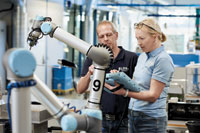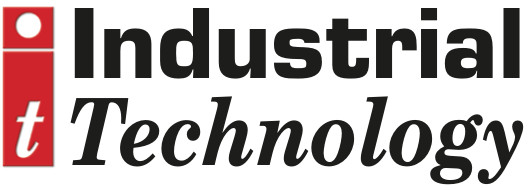
Posted to News on 25th Jun 2019, 00:00
Smart automation
Mark Gray of Universal Robots tackles fears surrounding smart automation and artificial intelligence.

The concept of Artificial Intelligence (AI) and smart automation are being thrown around more and more frequently in the manufacturing sector. These are divisive in nature and have led to the uproar around ‘killer robots’ as well as the idea that robots will take over and ultimately replace the human workforce. With these extreme ideas dominating the headlines daily, it is no wonder the trend is causing panic and confusion among employers and employees alike. However, these concepts are closer to an episode of Black Mirror than to reality.
In fact, automation very rarely means AI. Some of the most successful automation projects use robots purely as a tool, and it is in their straightforward applications that robots are delivering real value. These technologies are not here to take over jobs but rather to lend human workers a helping hand in order to give production a boost.
Political turmoil, the rising labour and skills gaps and growing prices of raw materials have all led to pressure for UK manufacturers to keep up with market demands. There is a need for enhanced agility to quickly respond to changing market requirements and to meet customer demands for greater levels of customisation and personalisation, yet many lack the right tools to do so. Manufacturers around the country are therefore struggling to boost productivity without increasing the number of employees – a task particularly pressing for SMEs with smaller budgets trying to remain competitive against large corporations. To survive these challenges, manufacturers must embrace the factory of the future and implement automation as part of an industry 4.0 strategy in order to keep up with consumer demand.
Just as business operations vary, so too does automation needs. The selection of available automation technologies can be broad and confusing, especially when trying to find one which is suitable for a specific business requirement. However, while the automation landscape may at first seem complex, robotics is nothing to be frightened of. When SMEs are looking to take the first step into automation, it’s possible to unlock many of the same benefits with a more straight-forward approach.
Collaborative robots were developed for this purpose specifically, to work side by side and under the supervision of human workers. Instead of seizing the role of the human worker, they take over the most time sensitive and laborious tasks, leaving their human co-workers to complete more rewarding responsibilities which require human intuition and creativity. Viewing cobots simply as tools, just like any other objects that increase efficiency and eases the employees’ work-load, is a great way to introduce automation into a business.
Many tasks performed in production facilities can be automated and deploying a cobot saves workers from performing a repetitive and mindless task which may cause injuries and high staff turnover rates. Another benefit of cobots is that they have a small physical footprint and do not require safety guarding. This is important for SMEs as deploying cobots causes minimal disturbance to working operations and, unlike industrial robots which require huge floor-plan redesigns, cobots can seamlessly be placed into existing factory operations.
Due to their size, ease-of-use and flexibility they can take over most simple tasks, providing even the smallest factories an affordable automation option. Cobots offer a safe future investment thanks to their flexibility: no matter what task they were brought in to do, they can easily be re-programmed by existing staff to perform a completely different job when need be. This is crucial as the ability to adapt to changing customer demands can be the difference between winning or losing business. Contrary to popular belief, the future of manufacturing is not the so called ‘lights-out factories’ running 24/7 without any human involvement, the reality is actually to the contrary. Due to the demand for personalised and customised goods, human-involvement is necessary in order to produce individualised products, services and experiences.
Human workers will therefore not be made redundant, it is only the tasks they undertake that will evolve. In fact, a recent report by the World Economic Forum suggests that while robots are expected to displace 75 million jobs globally in the next decade, a further 133 million could be created specifically due to automation as humans adapt and take on new tools and skills.
Therefore, even if robots put a certain number of assembly workers out of work, they will create newer – and higher paying – jobs in fields like programming, quality control and back office operations. Putting a ‘human-touch’ back into manufacturing processes is important and can only be achieved by pairing the technical capabilities and consistent repetitiveness of robots with the unique creative skills of humans.
Manufacturers shouldn’t get overwhelmed by the numerous smart technologies that are available or by the idea that all businesses need to undergo a complete and instant digital transformation in order to survive. Automation comes in many shapes and forms, and cobots enable SMEs to take these first steps while still maintaining the flexibility necessary to allow businesses to adapt to meet changing market demands. Cobots should simply be viewed as another tool in the tool box, brought in to both enhance and ease the workload for employees.








